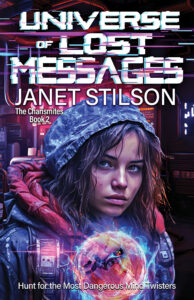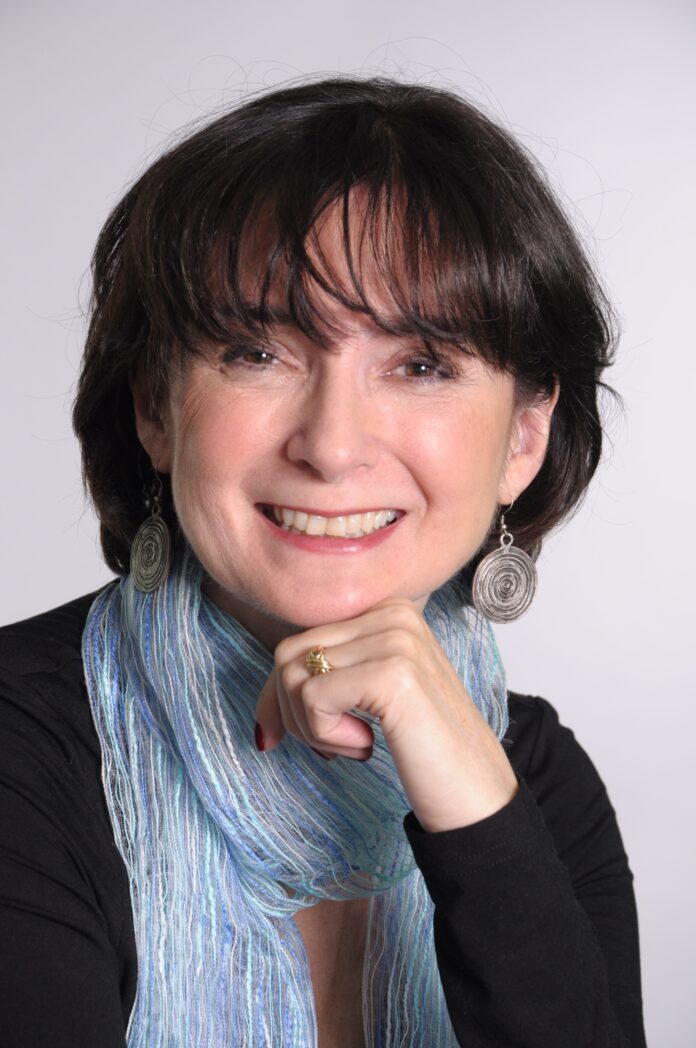We are welcoming author Janet Stilson to the blog today. We’ll be talking about her latest cyberpunk science fiction novel UNIVERSE OF LOST MESSAGES.
Our readers want to know what inspired you to start writing novels?
It took me a while to fall in love with writing books. I was first attracted to short stories, and then film and television scripts. Novels seemed a little intimidating, like swimming from Cuba to Key West à la Diana Nyad. In other words, an endurance test, minus the sharks but with the occasional mental monster. Then I had an epiphany: the chapters in a book could be thought of as short stories linked together by an overall storyline. More like a patchwork quilt, or a series of lily pads. That made the process seem much more exciting.
Working on books became liberating—the ability to create an entire story. Screenwriters are just one element in a storytelling creative process. Their scripts are like skeletons, and other creatives add layers to it—actors, directors, cinematographers, so many others. Novels gave me the freedom to write descriptions that were more immersive, to convey characters’ feelings and thoughts more clearly, and to explore all five senses—including taste, smell, and touch.
How did you come up with the concept of a universe filled with lost messages in your latest novel?
Every now and then, an email that has some importance gets trapped in my junk mail folder. It seems to happen to just about everybody. In trying to find some humor in the situation, I imagined a place, somewhere out in the upper stratosphere, where all those missing messages are trapped. One thing led to another.
What about science fiction appeals to you as a writer?
I’m going to back into the answer to that question. I recently listened to an interview featuring Emily St. John Mandel, talking about the inspiration for her novel Station Eleven, which I love. She said that what interested her, in telling that apocalyptic pandemic tale, wasn’t the horrific aspects of what happened during the height of the crisis. Rather, she wanted to explore reasons for hope as time went by, after the initial period of shock and terror. One of her recurring quotes in the novel is “Survival is insufficient,” which is from a Star Trek episode.
In a similar way, I wanted to write the kind of dystopian story that isn’t all bleak or seems like an intellectual exercise. I really believe that no matter how dark the future might be, it will also be filled with humane acts, moments of humor, and an inventive spirit.
I also felt there were futuristic stories inside me that hadn’t been written before—that I could offer something fresh. The two novels in “The Charismite” series imagine what the media business will be like a few decades into the future. In my role as a journalist, I’ve spent time inside big media companies and talked with their executives about new shows and technology. I’ve also observed how powerful sources of information are used and abused. A passionate vision emerged in me, to tell a speculative story with an eclectic assortment of characters tackling life-or-death problems related to all that.
Who is your favorite character in science fiction?
Kizzy in Becky Chambers’ “Wayfarers” series. When she first shows up in The Long Way to a Small, Angry Planet, Kizzy is a so-called mech tech aboard an airship. And her conversation with other people and sentient beings made me smile. To give you a taste of her, here’s how Kizzy is first described:
“Her black hair was tied back in a lopsided bun, held together with a frayed, faded ribbon. She wore an orange jumpsuit smudged with grease and gunk, patched on the elbows with bright fabric and big stitches. There were hasty notes handwritten on her sleeves, things like “CHECK 32-B—OLD WIRES?” and “DON’T FORGET AIR FILTERS YOU DUMMY” and “EAT.” Perched on her flat nose was a set of curious optical lenses. Rather than just one lens per eye, there were no fewer than half a dozen attachments welded onto hinged supports. Some bulged and magnified, others flickered with tiny digital panels.”
Is that crazy cool or what? I want to be Kizzy’s bestie!
What are some recurring themes in your work?
The one that is most prominent is “searching for the truth.” It’s kind of an occupational obsession for a lot of journalists.
What advice do you have for new writers?
Try to write nearly every day—even if it’s only 300 words that you hate. That’s the way to build the mental muscles that you’re going to need. Become a creature of habit, in that regard. Don’t think that you need to have some huge surge of inspiration every time you sit down to write. Nine times out of 10, the surges come because you’ve sat down no matter what. Maybe days or weeks will go by before you really get a creative burst. You’ll have those revelations more frequently if you sit there in your “sailboat” beneath limp sails, gazing at a flat-calm ocean that never seems to end. Believe me, it will. That’s part of the work.
Also, newcomers should realize that first drafts almost always suck, unless you’re a genius. Hate people like that, LOL! I refer to it as plowing virgin soil—full of rocks and annoying roots. Just get through it and know that while it might be tough and frustrating, the writing will become easier with each successive draft. At least, that’s my experience.
Finally, find your people. Mentors are amazing gifts. But I’m talking about other writers whose work you admire and who are at roughly your same level of success and learning. Form writing groups with them, or simply give each other feedback on an informal basis whenever it’s needed. Honesty and kindness are both critical. You don’t want people who are brutal critics, but instead offer constructive advice or perspective. With the right circle of people, your work will improve and some of those friends may provide a shoulder of support when you get some tough rejections or are in a writing slump.
And about those rejections: they are pretty much guaranteed. A lot of them. But if you feel passionate about writing, you’ll develop the mental armor to get past them. With diligence and careful examination of your work, you’ll improve.
What are you working on now?
Some short stories. After working on Universe of Lost Messages over a long stretch, writing briefer tales provides some variety. They are also a great way to germinate ideas for more elaborate stories in the future.
Thank you so much, Janet for joining us today! Readers, UNIVERSE OF LOST MESSAGES releases today! Make sure you snag a copy!
Here’s a quick look………
 What if your child has special powers and can get people to do almost anything? What happens if the child is abducted?
What if your child has special powers and can get people to do almost anything? What happens if the child is abducted?
Izzie and Tristan were never mere humans. They are Charismites, with almost god-like powers of magnetism. And they couldn’t be more different. Izzie is a reckless, playful megastar whose popularity far exceeds that of any other celebrity. Tristan is a nature-loving recluse, almost completely unknown to anyone beyond a protective biodome.
Their worlds explode when they are abducted by The Fist, a power-hungry political group with a master plan to control the hearts and minds of all people on Earth and satellite colonies beyond. But the plan only works with the help of Charismites.
Their families don’t have much to go on until a feisty, street-wise teen, Cheeta, discovers clues about the Charismites within a strange metaverse filled with millions of missing messages. But will they actually find them? And can they destroy The Fist before they take over the planet?
Filled with an eclectic cast of characters, a slow-burn romance, humor, and wonderful descriptions of a sensual and sometimes violent world, Universe of Lost Messages is a stand-alone sequel to Janet Stilson’s beloved novel, The Juice. Fans of William Gibson, Margaret Atwood, dystopian novels and science fiction thriller books will devour this masterful adventure.






